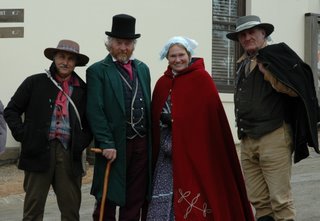
Melbourne was formed in 1935 by European settlers, mostly heading in from Tasmania in search of better land. By 1951, the population had reached a steady 29,000, and broke away from New South Wales, thus forming the colony of Victoria. The discovery of gold at places such as
Ballarat lead to a
frenzied scramble to get as much of it out of the ground in as short a time as possible, and an explosion in immigration. This had the effect of easily making Victoria the richest state, and Melbourne the most populous city (at the time). Today it's the largest inland city in Victoria (even though it has a population of 90,000, the centre is best described as 'sparse', and had me scratching my head as to the exact definition of 'City'). We made a weekend trip out to the place in an attempt to find out a bit more about how the state was forged - I've put this as a separate post because I think certain members of my family might be interested in all this.

I had little idea of what Ballarat would be like in advance - aside from it being a little known song by The Lemonheads, and that it meant 'Resting Place' in it's Aboriginal spelling. We booked ourselves into a slightly dog-eared looking hostel which, despite having perfectly nice rooms, induced a distinct feel of unease in me ... maze like corridors, an undefined musty smell, slightly spaced out receptionist and vague signs alluding to different sets of rules for 'visitors' and 'permanent residents' - whatever the hell that means. Dan made some crack about it being haunted, but I never did like the idea of checking into a room which has a huge sign above it saying 'No Exit' ... ever played the old PC game
Alone In The Dark ? It was like that. Anyway, we made a token attempt to hit the town, as it was Saturday night after all. Ballarat is no exception to anywhere else that we've been in Austalia in that it takes a lot of pride in the quality of food available - you certainly won't be complaining, provided you can afford it. There was precious little in the way of entertainment, so we took a chance on a fairly rubbish British themed pub. Unexpectedly, I was harrassed up by some rowdy old hens while Dan got the drinks in - apparantly I'm a "cuuuuutie". O technicolour harridan, how blootered ye are. Ballarat's oddballs weren't done for the evening, however ... a peculiar old fellow in the "Irish" pub insisted on chewing our ears off for the best part of an hour. Three topics only were discussed - "You boys are alright", "What time is it ?" and "You look just like Mick Jagger". Until he got so pissed he almost fell of his stool - ahh, how the world loves a drunk. Like the time in Rising Sun when a fight broke out to the strains of "What's New, Pussycat ?", the lesson is clear : avoid themed pubs at all costs.

Thankfully that wasn't the reason we were there, however. The economy of Ballarat these days is mostly about tourism - focused on Sovereign Hill, a sort of cross between Legoland and the set of
Deadwood. I was pleasantly surprised that it was a lot less tacky than expected, and actually did a very good job of educating an addle-brained layabout like myself to the hardships of the time (the fact that it pissed it down for the first half of the day, turning the ground to mud, actually added an air of authenticity). Victorian London, awesome fashions aside, was probably not a huge barrel of laughs - unless you were filthy rich (not just filthy). On the tail end of the industrial revolution, I should imagine that grime, noise, disease, inescapable poverty, endemic crime and a lot of other miscellaneous misery were the order of the day. Small wonder those who could sold everything they owned in cities all over Britain, to gamble on a ticket to Australia and other parts of the colonies for the
goldrushes - a continuing theme of the 19th century. Poor buggers, a lot of them did not exactly find the good life they were expecting, though of course some did become hideously wealthy. There's no getting away from how hard it would be working in these conditions - boys as young as 11 were shoved into the mines, and the backbreaking (and often fruitless) labour defined the spirit of the area for generations. Once most of the easy to get at gold (i.e. at the surface / in rivers) had dried up, there was still tons more below the surface. Extracting this was obviously beyond the means of most independant workers, so huge mining companies were set up to drill out the deposits, usually in quartz seams. The conditions were completely atrocious - dangerous, filthy, deafeningly loud, dark, hot, humid - not to mention the health
dangers of all the dust. There wasn't much in the way of worker's rights or unions, and it was a hard, hard life. Other contributing factors eventually led to the
Eureka Stockade - a rebellion that took place in 1854, which although didn't technically achieve it's aims, became known as the 'Birth of Australian Democracy'. The symbol of the revolt was the
Eureka Flag, still used as an emblem for a wide variety of causes (there were several people wearing T-shirts with it on around town - I'm not absoloutely sure why this was). It depicts the
Southern Cross - visible on the flags of Australia and New Zealand, and also the night sky.
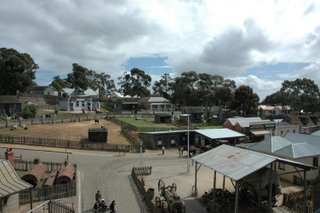
This is the sort of place you can learn a little about a lot in a short space of time - it's always interesting how different strands of history and other subjects meet up with each other at certain points. I must confess that, other than electrical and heat conductivity, I had only a vague inkling as to why gold was valued so highly ... why not some other material ? Aside from looking nice, the answer is quite simple : it doesn't change much. It's quite uniform, and once you've got it out of the ground, you can put it out the way for years and years. Provided someone doesn't nick it, it will be exactly as left - it won't corrode or evaporate or anything else. Thus it was very popular with early merchants and traders - the fact that it's not exactly easy to find made it ideal for a
form of money. There was also a rudimentary stock exchange going on, with shares in mining companies being sold to raise the capital for equipment etc. Many of the subjects discussed at Sovereign Hill were echoes of events going on elsewhere in the British Empire. It's easy to imagine the long term effect on a nation's psyche with events such as these - aside from the convict history (more on this in the next post), the lives of the people involved would have been based almost entirely around sheer hard work. Much stock was taken on the reliance of oneself, but also the importance of other people, appreciation of hearty food (rare that it was), and games and music in the camps that provided a relief, however brief, from the toil of the day.
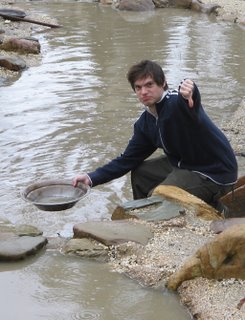
There's a very remote chance you might still find some fluvial gold (i.e. found loose in water). This is me having a go at panning for it. Seven days I wasted on this, with the bare minimum of vittles ... did I find any ? Did I fu
[post edited by Blogspot administrators due to outrageously coarse language]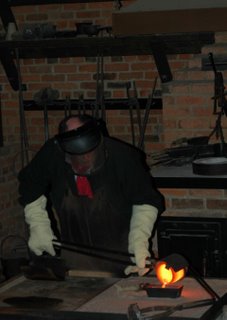
Once the shiny stuff is out of the ground, it needs to melted down (at a temperature of just over 1000 C), for removing impurities and forming into handy bars - this is a demonstration of how the process works. The chap on the left there, in true Blue Peter 'here's one I did earlier' style, takes a pot of molten gold and pours it directly into a cast. He then dumps the lot into a water trough (producing an impressive amount of steam in the process, I almost expected him to start cackling or something), and in the space of a couple of minutes it goes from being over a thousand degrees to being cool enough to touch. About the size of two large chocolate bars, in English pounds it's worth around 28 grand.
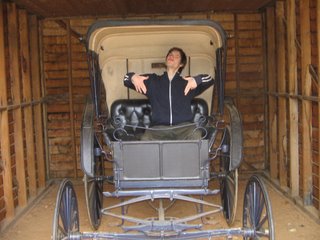
Poop poop ! The 1850s answer to "Pimp My Ride". I do love Victorian era transport. Perhaps because I grew up in a house with a Penny Farthing parked in the hall. Given that I won't have a car when I get back, and my normal bike has got dodgy brakes, I think it may become my main mode of transport. If my parents have sold it in my absence, I shall never forgive them - they're crafty buggers, can't turn my back for a minute.
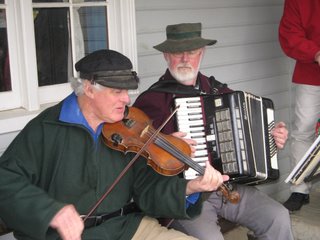
This was unexpected ... Neutral Milk Hotel have apparantly reformed. Yay !
 Melbourne was formed in 1935 by European settlers, mostly heading in from Tasmania in search of better land. By 1951, the population had reached a steady 29,000, and broke away from New South Wales, thus forming the colony of Victoria. The discovery of gold at places such as Ballarat lead to a frenzied scramble to get as much of it out of the ground in as short a time as possible, and an explosion in immigration. This had the effect of easily making Victoria the richest state, and Melbourne the most populous city (at the time). Today it's the largest inland city in Victoria (even though it has a population of 90,000, the centre is best described as 'sparse', and had me scratching my head as to the exact definition of 'City'). We made a weekend trip out to the place in an attempt to find out a bit more about how the state was forged - I've put this as a separate post because I think certain members of my family might be interested in all this.
Melbourne was formed in 1935 by European settlers, mostly heading in from Tasmania in search of better land. By 1951, the population had reached a steady 29,000, and broke away from New South Wales, thus forming the colony of Victoria. The discovery of gold at places such as Ballarat lead to a frenzied scramble to get as much of it out of the ground in as short a time as possible, and an explosion in immigration. This had the effect of easily making Victoria the richest state, and Melbourne the most populous city (at the time). Today it's the largest inland city in Victoria (even though it has a population of 90,000, the centre is best described as 'sparse', and had me scratching my head as to the exact definition of 'City'). We made a weekend trip out to the place in an attempt to find out a bit more about how the state was forged - I've put this as a separate post because I think certain members of my family might be interested in all this. I had little idea of what Ballarat would be like in advance - aside from it being a little known song by The Lemonheads, and that it meant 'Resting Place' in it's Aboriginal spelling. We booked ourselves into a slightly dog-eared looking hostel which, despite having perfectly nice rooms, induced a distinct feel of unease in me ... maze like corridors, an undefined musty smell, slightly spaced out receptionist and vague signs alluding to different sets of rules for 'visitors' and 'permanent residents' - whatever the hell that means. Dan made some crack about it being haunted, but I never did like the idea of checking into a room which has a huge sign above it saying 'No Exit' ... ever played the old PC game Alone In The Dark ? It was like that. Anyway, we made a token attempt to hit the town, as it was Saturday night after all. Ballarat is no exception to anywhere else that we've been in Austalia in that it takes a lot of pride in the quality of food available - you certainly won't be complaining, provided you can afford it. There was precious little in the way of entertainment, so we took a chance on a fairly rubbish British themed pub. Unexpectedly, I was harrassed up by some rowdy old hens while Dan got the drinks in - apparantly I'm a "cuuuuutie". O technicolour harridan, how blootered ye are. Ballarat's oddballs weren't done for the evening, however ... a peculiar old fellow in the "Irish" pub insisted on chewing our ears off for the best part of an hour. Three topics only were discussed - "You boys are alright", "What time is it ?" and "You look just like Mick Jagger". Until he got so pissed he almost fell of his stool - ahh, how the world loves a drunk. Like the time in Rising Sun when a fight broke out to the strains of "What's New, Pussycat ?", the lesson is clear : avoid themed pubs at all costs.
I had little idea of what Ballarat would be like in advance - aside from it being a little known song by The Lemonheads, and that it meant 'Resting Place' in it's Aboriginal spelling. We booked ourselves into a slightly dog-eared looking hostel which, despite having perfectly nice rooms, induced a distinct feel of unease in me ... maze like corridors, an undefined musty smell, slightly spaced out receptionist and vague signs alluding to different sets of rules for 'visitors' and 'permanent residents' - whatever the hell that means. Dan made some crack about it being haunted, but I never did like the idea of checking into a room which has a huge sign above it saying 'No Exit' ... ever played the old PC game Alone In The Dark ? It was like that. Anyway, we made a token attempt to hit the town, as it was Saturday night after all. Ballarat is no exception to anywhere else that we've been in Austalia in that it takes a lot of pride in the quality of food available - you certainly won't be complaining, provided you can afford it. There was precious little in the way of entertainment, so we took a chance on a fairly rubbish British themed pub. Unexpectedly, I was harrassed up by some rowdy old hens while Dan got the drinks in - apparantly I'm a "cuuuuutie". O technicolour harridan, how blootered ye are. Ballarat's oddballs weren't done for the evening, however ... a peculiar old fellow in the "Irish" pub insisted on chewing our ears off for the best part of an hour. Three topics only were discussed - "You boys are alright", "What time is it ?" and "You look just like Mick Jagger". Until he got so pissed he almost fell of his stool - ahh, how the world loves a drunk. Like the time in Rising Sun when a fight broke out to the strains of "What's New, Pussycat ?", the lesson is clear : avoid themed pubs at all costs. Thankfully that wasn't the reason we were there, however. The economy of Ballarat these days is mostly about tourism - focused on Sovereign Hill, a sort of cross between Legoland and the set of Deadwood. I was pleasantly surprised that it was a lot less tacky than expected, and actually did a very good job of educating an addle-brained layabout like myself to the hardships of the time (the fact that it pissed it down for the first half of the day, turning the ground to mud, actually added an air of authenticity). Victorian London, awesome fashions aside, was probably not a huge barrel of laughs - unless you were filthy rich (not just filthy). On the tail end of the industrial revolution, I should imagine that grime, noise, disease, inescapable poverty, endemic crime and a lot of other miscellaneous misery were the order of the day. Small wonder those who could sold everything they owned in cities all over Britain, to gamble on a ticket to Australia and other parts of the colonies for the goldrushes - a continuing theme of the 19th century. Poor buggers, a lot of them did not exactly find the good life they were expecting, though of course some did become hideously wealthy. There's no getting away from how hard it would be working in these conditions - boys as young as 11 were shoved into the mines, and the backbreaking (and often fruitless) labour defined the spirit of the area for generations. Once most of the easy to get at gold (i.e. at the surface / in rivers) had dried up, there was still tons more below the surface. Extracting this was obviously beyond the means of most independant workers, so huge mining companies were set up to drill out the deposits, usually in quartz seams. The conditions were completely atrocious - dangerous, filthy, deafeningly loud, dark, hot, humid - not to mention the health dangers of all the dust. There wasn't much in the way of worker's rights or unions, and it was a hard, hard life. Other contributing factors eventually led to the Eureka Stockade - a rebellion that took place in 1854, which although didn't technically achieve it's aims, became known as the 'Birth of Australian Democracy'. The symbol of the revolt was the Eureka Flag, still used as an emblem for a wide variety of causes (there were several people wearing T-shirts with it on around town - I'm not absoloutely sure why this was). It depicts the Southern Cross - visible on the flags of Australia and New Zealand, and also the night sky.
Thankfully that wasn't the reason we were there, however. The economy of Ballarat these days is mostly about tourism - focused on Sovereign Hill, a sort of cross between Legoland and the set of Deadwood. I was pleasantly surprised that it was a lot less tacky than expected, and actually did a very good job of educating an addle-brained layabout like myself to the hardships of the time (the fact that it pissed it down for the first half of the day, turning the ground to mud, actually added an air of authenticity). Victorian London, awesome fashions aside, was probably not a huge barrel of laughs - unless you were filthy rich (not just filthy). On the tail end of the industrial revolution, I should imagine that grime, noise, disease, inescapable poverty, endemic crime and a lot of other miscellaneous misery were the order of the day. Small wonder those who could sold everything they owned in cities all over Britain, to gamble on a ticket to Australia and other parts of the colonies for the goldrushes - a continuing theme of the 19th century. Poor buggers, a lot of them did not exactly find the good life they were expecting, though of course some did become hideously wealthy. There's no getting away from how hard it would be working in these conditions - boys as young as 11 were shoved into the mines, and the backbreaking (and often fruitless) labour defined the spirit of the area for generations. Once most of the easy to get at gold (i.e. at the surface / in rivers) had dried up, there was still tons more below the surface. Extracting this was obviously beyond the means of most independant workers, so huge mining companies were set up to drill out the deposits, usually in quartz seams. The conditions were completely atrocious - dangerous, filthy, deafeningly loud, dark, hot, humid - not to mention the health dangers of all the dust. There wasn't much in the way of worker's rights or unions, and it was a hard, hard life. Other contributing factors eventually led to the Eureka Stockade - a rebellion that took place in 1854, which although didn't technically achieve it's aims, became known as the 'Birth of Australian Democracy'. The symbol of the revolt was the Eureka Flag, still used as an emblem for a wide variety of causes (there were several people wearing T-shirts with it on around town - I'm not absoloutely sure why this was). It depicts the Southern Cross - visible on the flags of Australia and New Zealand, and also the night sky. This is the sort of place you can learn a little about a lot in a short space of time - it's always interesting how different strands of history and other subjects meet up with each other at certain points. I must confess that, other than electrical and heat conductivity, I had only a vague inkling as to why gold was valued so highly ... why not some other material ? Aside from looking nice, the answer is quite simple : it doesn't change much. It's quite uniform, and once you've got it out of the ground, you can put it out the way for years and years. Provided someone doesn't nick it, it will be exactly as left - it won't corrode or evaporate or anything else. Thus it was very popular with early merchants and traders - the fact that it's not exactly easy to find made it ideal for a form of money. There was also a rudimentary stock exchange going on, with shares in mining companies being sold to raise the capital for equipment etc. Many of the subjects discussed at Sovereign Hill were echoes of events going on elsewhere in the British Empire. It's easy to imagine the long term effect on a nation's psyche with events such as these - aside from the convict history (more on this in the next post), the lives of the people involved would have been based almost entirely around sheer hard work. Much stock was taken on the reliance of oneself, but also the importance of other people, appreciation of hearty food (rare that it was), and games and music in the camps that provided a relief, however brief, from the toil of the day.
This is the sort of place you can learn a little about a lot in a short space of time - it's always interesting how different strands of history and other subjects meet up with each other at certain points. I must confess that, other than electrical and heat conductivity, I had only a vague inkling as to why gold was valued so highly ... why not some other material ? Aside from looking nice, the answer is quite simple : it doesn't change much. It's quite uniform, and once you've got it out of the ground, you can put it out the way for years and years. Provided someone doesn't nick it, it will be exactly as left - it won't corrode or evaporate or anything else. Thus it was very popular with early merchants and traders - the fact that it's not exactly easy to find made it ideal for a form of money. There was also a rudimentary stock exchange going on, with shares in mining companies being sold to raise the capital for equipment etc. Many of the subjects discussed at Sovereign Hill were echoes of events going on elsewhere in the British Empire. It's easy to imagine the long term effect on a nation's psyche with events such as these - aside from the convict history (more on this in the next post), the lives of the people involved would have been based almost entirely around sheer hard work. Much stock was taken on the reliance of oneself, but also the importance of other people, appreciation of hearty food (rare that it was), and games and music in the camps that provided a relief, however brief, from the toil of the day. There's a very remote chance you might still find some fluvial gold (i.e. found loose in water). This is me having a go at panning for it. Seven days I wasted on this, with the bare minimum of vittles ... did I find any ? Did I fu [post edited by Blogspot administrators due to outrageously coarse language]
There's a very remote chance you might still find some fluvial gold (i.e. found loose in water). This is me having a go at panning for it. Seven days I wasted on this, with the bare minimum of vittles ... did I find any ? Did I fu [post edited by Blogspot administrators due to outrageously coarse language] Once the shiny stuff is out of the ground, it needs to melted down (at a temperature of just over 1000 C), for removing impurities and forming into handy bars - this is a demonstration of how the process works. The chap on the left there, in true Blue Peter 'here's one I did earlier' style, takes a pot of molten gold and pours it directly into a cast. He then dumps the lot into a water trough (producing an impressive amount of steam in the process, I almost expected him to start cackling or something), and in the space of a couple of minutes it goes from being over a thousand degrees to being cool enough to touch. About the size of two large chocolate bars, in English pounds it's worth around 28 grand.
Once the shiny stuff is out of the ground, it needs to melted down (at a temperature of just over 1000 C), for removing impurities and forming into handy bars - this is a demonstration of how the process works. The chap on the left there, in true Blue Peter 'here's one I did earlier' style, takes a pot of molten gold and pours it directly into a cast. He then dumps the lot into a water trough (producing an impressive amount of steam in the process, I almost expected him to start cackling or something), and in the space of a couple of minutes it goes from being over a thousand degrees to being cool enough to touch. About the size of two large chocolate bars, in English pounds it's worth around 28 grand. Poop poop ! The 1850s answer to "Pimp My Ride". I do love Victorian era transport. Perhaps because I grew up in a house with a Penny Farthing parked in the hall. Given that I won't have a car when I get back, and my normal bike has got dodgy brakes, I think it may become my main mode of transport. If my parents have sold it in my absence, I shall never forgive them - they're crafty buggers, can't turn my back for a minute.
Poop poop ! The 1850s answer to "Pimp My Ride". I do love Victorian era transport. Perhaps because I grew up in a house with a Penny Farthing parked in the hall. Given that I won't have a car when I get back, and my normal bike has got dodgy brakes, I think it may become my main mode of transport. If my parents have sold it in my absence, I shall never forgive them - they're crafty buggers, can't turn my back for a minute. This was unexpected ... Neutral Milk Hotel have apparantly reformed. Yay !
This was unexpected ... Neutral Milk Hotel have apparantly reformed. Yay !


5 Comments:
Mark my words, Mother ... I intend not only to ride the infernal contraption, but to do so in full period costume. The top hat I can get from somewhere in Eton, but the monocle may prove a more taxing procurement. Ebay perhaps ?
In any case, I shall take pictures of this and then post them on the internacht.
Now if you will excuse me, I have a lecture on phrenology to attend - I am told this is the science of the future. Good day.
By James, at 5:01 PM
James, at 5:01 PM
That you never rode this penny farthing to the pub saddens me. See to it that this is rectified once you're back.
By Anonymous, at 3:49 PM
Anonymous, at 3:49 PM
If you manage that, I'll head to Cornwall and see if I can a job in a tin mine (bit tricky they shut down years ago, but I shall try none the less).
By Dan, at 9:36 PM
Dan, at 9:36 PM
That you never rode this penny farthing to the pub saddens me. See to it that this is rectified once you're back.
Who's that ? :)
By James, at 10:02 PM
James, at 10:02 PM
Whoopsie! Anonermouse comment was me - Zaf!
By Anonymous, at 11:13 AM
Anonymous, at 11:13 AM
Post a Comment
<< Home